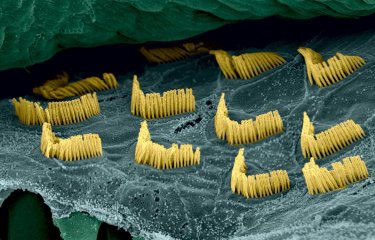- The framework extension agreement underlines the successful collaboration between Sensorion and the Institut Pasteur, involving the Hearing Institute, a research center of the Institut Pasteur, focused on the development of gene therapy programs
- Two gene therapy development programs are currently being conducted under this agreement, including SENS-501 (OTOF-GT) and GJB2-GT. Sensorion submitted a Clinical Trial Application in July 2023 for SENS-501 to initiate a Phase 1/2 clinical trial in the United Kingdom (UK) and in the European Union (EU)
The Institut Pasteur and Sensorion (FR0012596468 – ALSEN), a pioneering clinical-stage biotechnology company which specializes in the development of novel therapies to restore, treat and prevent within the field of hearing loss disorders, today announce that the research partnership framework agreement signed in 2019 - granting Sensorion an option for exclusive licenses to develop and market gene therapy drug candidates from collaborative projects to address unmet medical needs in the hearing field - has been extended for a period of five years. The agreement has been amended to be extended up to December 31, 2028, to promote additional development gene therapy programs.
SENS-501, the most advanced program within the partnership that targets deafness caused by mutations in the gene coding for otoferlin, defined as a priority in 2019, has met its objectives. The successful completion of the efficacy preclinical package in the frame of the collaboration between Sensorion and the Institut Pasteur advanced the program with the development of the OTOF-GT product (SENS-501) towards clinical stage. A Clinical Trial Application (Audiogene, Phase 1/2 clinical study) has been submitted in July 2023 in the UK and in the EU to evaluate the safety, tolerability, and efficacy of intra-cochlear injection of SENS-501 in patients suffering from otoferlin gene-mediated hearing loss.
The research partnership successfully led to a second gene therapy program with GJB2-GT, announced in 2021, for which a drug candidate, selected in April 2023, is currently in preclinical development. GJB2-GT targets deafness linked to mutations in the GJB2 gene, the most common form of childhood deafness. Three indications, all linked to GJB2 mutations, are currently being evaluated: early presbycusis, progressive hearing loss during childhood, and congenital hearing loss.
Over the past 25 years, the Institut Pasteur, has developed world-renowned expertise in the physiology and molecular pathophysiology of the auditory system with work carried out within the Institut Pasteur 's Genetics and Physiology of Hearing Unit, headed by Professor Christine Petit, and continuing within the Hearing Institute, a research center of the Institut Pasteur.
Sensorion has a preferential right on other Institut Pasteur preclinical research programs in the field of genetic diseases of the inner ear, with a view to establishing potential new collaborations.
Professor Christine Petit, Professor at the Institut Pasteur and Professor Emeritus at the Collège de France, France, Winner of the Kavli Prize in 2018, comments: "I am very satisfied with the progress of the partnership between the Institut Pasteur and Sensorion, and I am delighted that it has been extended. Over the past four years, our teams have achieved major milestones, enabling us to reach the clinical stage with our first gene therapy drug candidate in the field of deafness. We still have many challenges ahead of us to transform these scientific advances into innovations for the benefit of patients, whether in terms of advancing diagnosis and patient care, or developing curative treatments for hearing impairment."
Nawal Ouzren, Sensorion's Chief Executive Officer, adds: "By building on our partnership with the Institut Pasteur and its world-renowned scientific teams, and on the excellence of our development and production know-how, we have achieved, in just four years, a strategic turning point which today positions Sensorion among the leading players in gene therapy applied to hearing disorders. We are convinced that the continuation of the fruitful collaboration between the Institut Pasteur and Sensorion will contribute to the emergence of revolutionary new therapies for thousands of patients suffering from congenital deafness today."





